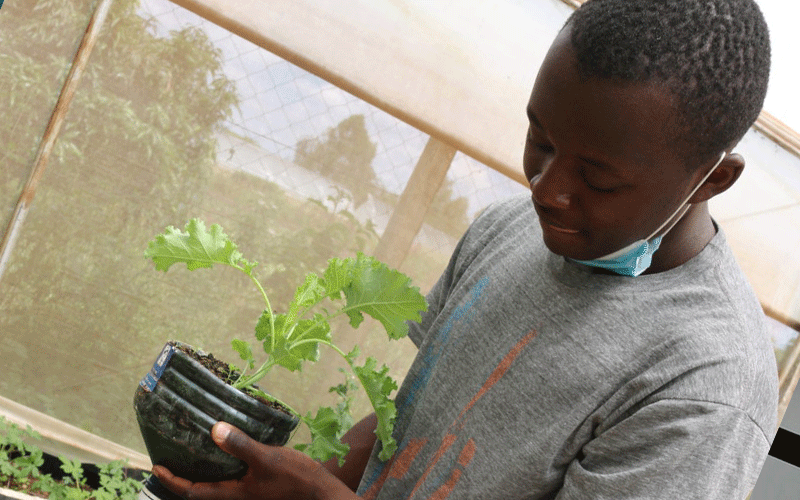JKUAT student sets up kitchen gardens to feed nation

Inspired by the success of women in arid areas in creating small shambas, Joash Walumoli decided to set up similar project for urban and informal settlements.
Joash Walumoli, Fourth year student at Jomo Kenyatta University of Agriculture and Technology (JKUAT), harboured dreams of popularising kitchen garden technology upon completion of his studies.
He had, for a while, put the dream on the shelf, waiting to complete his education before actualising it.
He watched from the fringes as women in arid and semi-arid areas and other parts of the country he had come across succeeded in setting up kitchen and sack gardens.
Then the Covid-19 pandemic came calling. “I could not wait any longer. Kitchen gardens are of utmost importance and are becoming very famous these days.
It can be pursued even in a small balcony, backyard or on rooftops” says the horticulture and food security student.
Covid-19 outbreak, which has come with food insecurity in low income communities, jostled the student to take action.
Hard hit urbanites
Walumoli decided the knowledge he had already gained was sufficient to offer a solution.
“I decided not to wait to graduate to make a contribution and come to the aid of vulnerable people in urban and informal settlements in dire need of food,” says Walumoil.
He says kitchen gardens have become a necessity as a way to supplement quality and affordable food to families especially during these harsh economic times, when incomes are not guaranteed because of the pandemic. 
Soon after the pandemic broke, the student, with support of the university and well-wishers mobilised members of the Horticulture Students Association (HoSA) on a mission to deliver the kitchen garden technology to hard hit urbanites with little space to farm.
“We have traversed the land installing kitchen gardens to those in need accelerated by the harsh economic conditions brought about by the closure of businesses due to the Covid-19 pandemic,” says Walumoli.
The gardens grow a variety of vegetables and herbs such as indigenous vegetables (terere, mrenda, managu, kunde), lettuce, Swiss chard, tomatoes, celery, basil, thyme, and spring onions, among others.
It is also possible to grow strawberries. “The vegetables are usually ready for harvest in a month’s time and seedlings can be used by the farmers for a maximum period of nine months,’ says Walumoli. Moli, as he is popularly referred to says “there are about 15 types of kitchen garden structures to choose from.
Although occasionally they also create the renowned ground kitchen garden, the most common requests for urban areas include containerised gardens, which use recycled containers, wooden box, capillary wick and vertical Polyvinyl chloride (PVC) gardens.
Food security
He says these are most popular because one is able to utilise the height in a tiny space such as a balcony.
An 18 feet pipe can hold up to 25 plants. The sack garden is the least popular because it requires a lot of soil and water.
The kitchen gardens can also adapt to any environment as the student advises their clients on the different methods of watering the plants depending on one’s needs.
Busy people can choose either drip irrigation or capillary wick method for faster watering of the plants.
In addition, one is taught on how to prepare these foods. The students also engage in other related services such as constructing full or mini greenhouses, installation of drip lines, diagnoses of crop diseases, seedlings production among others.
The costing of all their services depends on the materials required, family size, space available, and the intention of the small-scale farmer.
Their patron Prof John Wesonga, says the drive is a way by the students of giving back to society.
Prof Wesonga advises people to embrace such gardens as they do not only mitigate food insecurity, but also help prevent non-communicable diseases such as cancer which can be acquired through eating vegetables grown on soils with heavy metals.
The group also engages in youth empowerment. They have done this through the setting up of containerised gardens in Kibera slums, where they have taught many, on how to create such gardens in order to meet the diverse, distributed demands in the country.
The students also visit children’s homes to donate food and set up kitchen gardens.







